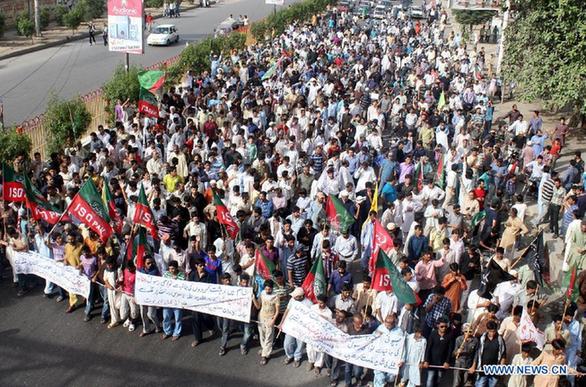Beyond civil war
- By Zhao Jinglun
 0 Comment(s)
0 Comment(s) Print
Print E-mail China.org.cn, July 29, 2013
E-mail China.org.cn, July 29, 2013
After two years of civil war, which has left 100,000 people dead, the situation in Syria remains murky. Backed by Russia and Iran and with Hezbollah joining the fight, the government of Bashar al-Assad seems to have the upper hand for now. Government forces took the strategic town of Qusair to regain control of central Syria and cut off rebel supplies being sent from supports in Lebanon.
|
|
|
Pakistani Shiite Muslims protest against the shelling of the mausoleum of Sayyida Zeinab, granddaughter of the Prophet Mohammed, in southern Pakistani port city of Karachi, on July 21, 2013. Rallies and protests were held across Pakistan against the attack on the shrine of mausoleum of Sayyida Zeinab in Syria. [Xinhua/Masroor] |
Anthony H. Cordeman of the Center for Strategic and International Studies said the civil conflict in Syria threatens to fuel a major conflict between Sunnis and Shiites throughout the Muslim world, with each side backed by different groups of countries.
The CIA assists Saudi Arabia and Qatar, who directly support and supply the rebels, in arming the rebels. Heavy weapons provided by the Saudis and Qatar for the Free Syrian Army include M-79 anti-tank weapons and M-60 recoilless rifles, shipped across the Jordanian border. The M-79 anti-tank weapons in particular give the rebels new confidence in attacking government positions. Supplies may also have come from Turkey and the United Arab Emirates.
The Western "Friends of Syria" are actually "Enemies of Syria" or "Friends of Jihad." The European Union has lifted its arms embargo on Syria, which was the brainchild of France and Britain, the former imperial powers that controlled the area.
They clamor for a "no-fly zone." But, according to Anthony H. Cordesman, who holds the Arleigh A. Burke Chair in Strategy at the Center for Strategic and International Studies, no one is advocating a serious U.S. air campaign, which would involve a substantial financial commitment and likely result in significant U.S. air casualties as Russian S-300 missile systems are coming to Damascus.
Former Russian Air Force General Anatoly Komukov told Interfax-AVN online that Damascus would need at least ten battalions of S-300 air defense missile systems to fully protect its territory from a possible NATO attack.
On July 5, Israel launched an air attack near Latakia, Syria's principal port city. The attack was not against S-300 missiles but against the Russian-made anti-ship missile, Yakhont, which threatens Western shipping transporting supplies to the rebels. In July 2006, Hezbollah fired an anti-ship missile which seriously damaged an Israeli ship. The Yakhont system is far more sophisticated than the one used in 2006.
The attack on Tatakia was the fourth known Israeli air attack against Syrian targets this year. In late January, Israeli planes attacked a weapons convoy carrying Russian-made SA-17 surface-to-air missiles, which Israel believed were to be supplied to Hezbollah.
In May, Israeli warplanes conducted two days of air strikes against shipments of Tateh-110 surface-to-surface missiles from Iran, which are capable of hitting Tel Aviv from southern Lebanon.
Syria conflict is also a struggle between Russia and the United States, not directly but by proxy. Washington claims Syrian government used chemical weapons, thereby crossed U.S. red line. Obama declares U.S. will arm rebels. Russia said U.S. claim is not supported by evidence. On the other hand, Russia says it is the rebels that used chemical weapons.
To the chagrin of the Western powers, the rebel camp seems to be in disarray. Fierce fighting broke out in Aleppo after a jihadist group assassinated a senior Free Syrian Army (FSA) commander.
And then, there has been conflict among the jihadists themselves since April, as the Syrian Islamic rebel group Jabhat al-Nusra opposed what it calls a power grab by Abu Bakr al-Baghdadi, leader of the Islamic State of Iraq. Baghdadi insists he is head of a united jihadi brigade in Syria, defying orders from Ayman Zawahri, who became al Qaeda chief after Osama bin Laden was killed by American forces.
After the jail break in Iraq many of the five hundred escaped prisoners are believed to have come to Syria to fight alongside the jihadists.
With many foreign elements drawn into the fight, the conflict in Syria is far from a simple civil war. It is dividing Lebanon. It is also creating problems in Jordan and Turkey, pushing Iraq towards civil war and enhancing the influence of Iran.
So the U.S. Defense Intelligence Agency (DIA) Director David Shedd predicted the Syrian civil war could well last for "multiple years." He also warned that al-Qaeda in Iraq and Jabhat al-Nusra are gaining influence and could wind up taking over the rebellion outright as the war drags on.
The author is a columnist with China.org.cn. For more information please visit:
http://www.ccgp-fushun.com/opinion/zhaojinglun.htm
Opinion articles reflect the views of their authors, not necessarily those of China.org.cn.






